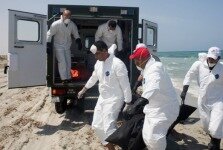Under the shadow of Boko Haram violence, Nigerians head to the polls Saturday (March 28) to elect a president and a deputy in a vote observers say is critical for the country’s stability and economic progress.
In a twist that might have been difficult to predict, many Christians in Nigeria’s north are backing a Muslim candidate to lead their country away from the brink of violence and chaos.
Muhammadu Buhari, a Muslim from the north and the leader of the All Progressives Congress party, is challenging the leadership of incumbent President Goodluck Jonathan, a Christian from the south who heads the ruling People’s Democratic Party.
Some Nigerians fear that another term for Jonathan would mean institutionalization of corruption and emergence of more Muslim extremist groups in addition to Boko Haram. And they are willing to pin their hopes on a Muslim candidate.
In February, the Northern Christian Leaders’ Eagle-Eyes Forum endorsed Buhari, saying the country needs a leader who can protect both Christians and Muslims. The nation’s Roman Catholic bishops have not formally endorsed a candidate but appear to lean that way as well.
“The bishops see him as a man of integrity and decency who can fight corruption and Boko Haram,” said the Rev. John Bakeni, secretary of the Maiduguri Roman Catholic Diocese.
Buhari may have helped his chances among Christians by choosing a church pastor as his running mate. Yemi Osinbajo, a senior pastor at the Redeemed Christian Church of God and a former attorney general of the state of Lagos, is from the country’s south, where Christians are the majority and where Jonathan has traditionally had most support.
Buhari, who previously led Nigeria from December 1983 to August 1985 after taking power in a coup, has assured Christians that he has no religious agenda.
Jonathan, meanwhile, faces criticisms of failing to stop the Islamic extremists. Under his watch, Nigerian troops had appeared unable to tackle the militant Boko Haram, which has now allied itself with the Islamic State group in Syria and Iraq.
Recently, the military, helped by armies from Cameroon, Chad and Niger, has been able to take back some towns previously captured by Boko Haram.
Religious leaders fear a repeat of the post-election violence of 2011, when hundreds of churches were torched and hundreds of Christians killed after Jonathan was declared the winner.
In Nairobi, an official at the All Africa Conference of Churches urged Jonathan and Buhari to show leadership “at this critical juncture in their country.”
“They must urge supporters to remain calm and refrain violence during the elections,” said Solomon Gichira, who is dealing with peace issues at the Africa-wide Protestant grouping.
Meanwhile, church sources say people are returning to their homes in northern Nigeria as the Multinational Joint Task Force, which is confronting Boko Haram, liberates areas from the extremists.




